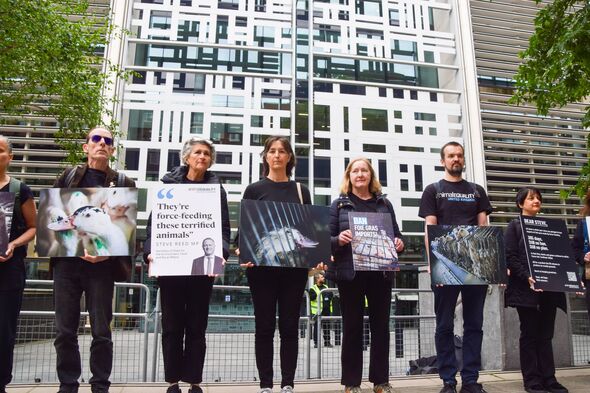Politics
Trade Talks Threaten Labour’s Commitment to Foie Gras Ban

Concerns over animal welfare are intensifying as ongoing trade negotiations threaten to derail the Labour Party’s commitment to banning the import of foie gras—a product widely criticized for its production methods. Campaigners have raised alarms following a letter from the Department for Environment, Food and Rural Affairs (Defra), which stated that while the government acknowledges the “serious welfare concerns” related to foie gras production, clarity on future actions remains elusive due to private discussions with international trade partners.
In the letter addressed to a concerned citizen, Defra indicated that it is “too early to discuss this in greater detail.” This message has prompted strong reactions from animal welfare advocates, including Abigail Penny, executive director of Animal Equality UK. Penny emphasized that the government had previously made a public promise to end the import of foie gras produced through force-feeding, a method that many consider a form of animal cruelty. She stated, “Surely officials are not willing to now trade away that promise behind closed doors? Britons want to see an end to this cruel product on our shores—the government must represent its people, not cave in to vested interests from those overseas.”
Public sentiment appears to align with Penny’s concerns, as nearly 90% of Britons support a ban on foie gras imports. Penny further noted, “Prioritising profit through trade deals over genuine animal protection is unacceptable to the British public, especially since nearly nine out of ten are in favour of a ban. A halt on foie gras imports cannot be sacrificed at the negotiation table.”
Labour’s position on the issue was previously articulated by Steve Reed, the environment secretary, who stated that the party would “ban the commercial import of foie gras, where ducks and geese are aggressively force-fed.” This promise was a significant point during the lead-up to the election, emphasizing Labour’s commitment to animal welfare.
The letter from Defra also referenced the Sanitary and Phytosanitary (SPS) Agreement as part of the rationale for the government’s current stance. The SPS Agreement aims to streamline trade in agricultural and food products and is a key element of Sir Keir Starmer’s broader vision for an EU-UK reset. This agreement is designed to make agrifood trade with the EU—Britain’s largest market—more efficient, reducing costs and regulatory burdens for producers and retailers.
Despite the government’s assurances regarding animal welfare, the production of foie gras through force-feeding has been banned in the UK for 17 years due to incompatibility with local animal welfare legislation. Defra reiterated its commitment, stating, “The government shares the British public’s high regard for animal welfare and has made clear that the production of foie gras from ducks or geese using force-feeding raises serious welfare concerns.”
As trade negotiations continue, the future of the foie gras ban remains uncertain, placing the Labour Party in a challenging position as it navigates between international trade obligations and domestic welfare commitments. The public and advocacy groups will undoubtedly be watching closely to see if the government upholds its promise to protect animal welfare amid these discussions.
-

 Entertainment2 months ago
Entertainment2 months agoIconic 90s TV Show House Hits Market for £1.1 Million
-

 Lifestyle4 months ago
Lifestyle4 months agoMilk Bank Urges Mothers to Donate for Premature Babies’ Health
-

 Sports3 months ago
Sports3 months agoAlessia Russo Signs Long-Term Deal with Arsenal Ahead of WSL Season
-

 Lifestyle4 months ago
Lifestyle4 months agoShoppers Flock to Discounted Neck Pillow on Amazon for Travel Comfort
-

 Politics4 months ago
Politics4 months agoMuseums Body Critiques EHRC Proposals on Gender Facilities
-

 Business4 months ago
Business4 months agoTrump Visits Europe: Business, Politics, or Leisure?
-

 Lifestyle4 months ago
Lifestyle4 months agoJapanese Teen Sorato Shimizu Breaks U18 100m Record in 10 Seconds
-

 Politics4 months ago
Politics4 months agoCouple Shares Inspiring Love Story Defying Height Stereotypes
-

 World4 months ago
World4 months agoAnglian Water Raises Concerns Over Proposed AI Data Centre
-

 Sports4 months ago
Sports4 months agoBournemouth Dominates Everton with 3-0 Victory in Premier League Summer Series
-

 World4 months ago
World4 months agoWreckage of Missing Russian Passenger Plane Discovered in Flames
-

 Lifestyle4 months ago
Lifestyle4 months agoShoppers Rave About Roman’s £42 Midi Dress, Calling It ‘Elegant’









